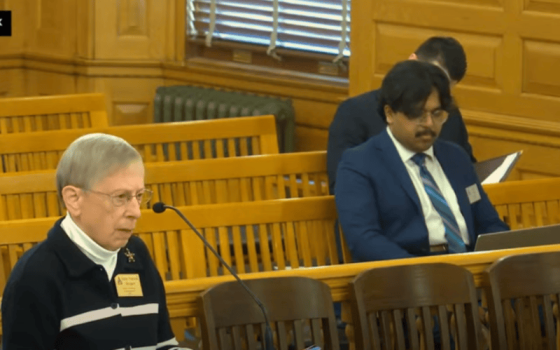PHOENIX -- A group of pro-immigrant rights activists in Arizona aim to develop a smartphone application that would help immigrants notify friends, family and their attorney if they are detained and arrested during a traffic stop.
Arizona was the first state to pass a law to make it a crime to be an undocumented immigrant (SB 1070), leading to an increased crackdown and climate of fear among immigrants. A recent Department of Justice investigation on racial profiling of Latinos by the Maricopa County Sheriff's Office found that Latinos were four to nine times more likely to be pulled over in a traffic stop than non-Latinos.
"When someone gets pulled over the first thing to worry about is the family," said Lydia Guzman, the president of the nonprofit Respect/Respeto.
{C}
For years, the nonprofit's emergency hotline has monitored cases of possible civil rights violations against Latinos by local law enforcement, provided information about rights, and tracked down missing family members in immigration custody after undocumented drivers are detained.
"It's difficult. We try to get all of this information from them to reach their family, while at the same time we're trying to advise them about their rights," she said.
It was Guzman's experience with Respect/Respeto and the increased crackdown on undocumented immigrants by local police using state laws that inspired her friend Todd Landfried, a spokesperson for Arizona Employers for Immigration Reform, to come up with an idea for a smartphone app that could do what the group does and more.
The app will allow users to notify family, friends, attorneys and even their consulate when they get pulled over by law enforcement or when they are facing an emergency situation that puts their safety or civil rights at risk.
With the touch of a button, Landfried says, the "Emergency Alert and Personal Protection" app will send a pre-set list of people information about the person's location using GPS technology and date and time of the incident. The app will also have an option to record audio and video, which is a common function on most mobile phones, but it will take it a step further by sending the audio and video to a "web interface" where the data can be stored and accessed by lawyers, for example.
It will also inform them, in English and Spanish, of their civil rights if they are arrested during a traffic stop; for example, reminding them that they have the right to remain silent and have an attorney present during questioning.
Guzman says the app could help people make split-second decisions at a crucial moment about who to call and how to get help. She says it would also provide immigrant advocates a starting point to search for undocumented immigrants once they are in the detention system -- a search that can sometimes take days.
In order to take the app from idea to reality, Landfried and Guzman recently launched a 30-day crowdfunding campaign to support the development of the app. If they reach their goal of raising $225,000, they will work with a software developer to have the app ready by July. Donors would get the app, which will cost about $2, for free.
The app is similar to the "I'm Getting Arrested" app that launched in response to the arrests of protestors involved in the Occupy movement. Landfried and Guzman say their app would be designed to specifically address the situation of undocumented immigrants pulled over in traffic stops. They say it would consolidate functions on the phone to allow users to document, store and send photos, audio and video to web interface that can be used to document racial profiling or violations of civil liberties.
Landfried says he believes Latinos are well-positioned to make use of such an app based on recent trends of Latinos' usage of smartphones.
According to a 2010 Nielsen Company report, 45 percent of Hispanic mobile users have a smartphone compared to just over a quarter of white mobile users.
Landfried and Guzman say they hope the app can be a tool for tracking statistics of potential instances of racial profiling.
"Keeping in mind you have to protect the attorney-client privilege," Landfried said. "If data was made anonymous, we can track how many times people hit the button for traffic stops and they can fill in later what the outcome was."
"This is about protecting people. Everybody has rights, whether you like it or not," he said.



